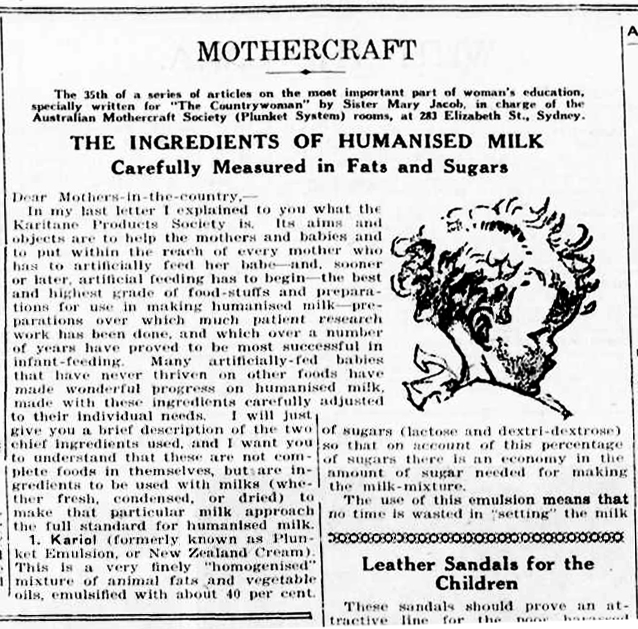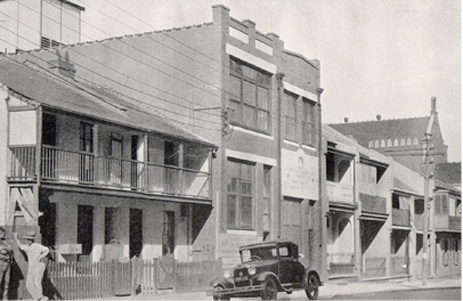The Dictionary of Sydney was archived in 2021.
Karitane Products Society factory Surry Hills
Citation
Persistent URL for this entry
To cite this entry in text
To cite this entry in a Wikipedia footnote citation
To cite this entry as a Wikipedia External link
Karitane Products Society factory Surry Hills
[media]Following the establishment of the Australian Mothercraft Society in 1923 and the Karitane Mothercraft Home, there was a move to establish a Karitane Products Society branch factory in Sydney. In New Zealand, Sir Truby King had developed products for modifying the protein content of cow's milk making it easier for babies to digest. He had imported materials in bulk to create Karilac, based on sugar of milk and Kariol, a mixture of oils and fats, so that they were affordable for mothers unable to breast feed. Australia's trade protection tariffs made these products expensive in Australia and this is probably why the factory was contemplated.
The Karitane Products Society was a registered Industrial Provident Society in New Zealand and managed by an honorary board chaired by prominent New Zealand businessman Sir William Hunt (1867–1939). Sir Truby King made a number of journeys to Sydney during 1929 to establish the factory at 72 Buckingham Street in Surry Hills. He supervised the importation and installation of the plant and the Commonwealth Department of Health assisted by remitting the 60 per cent duty on the machinery because of the 'educational and hygienic' work of the organisation.
The Depression
[media]By 1930, the factory was producing Karilac but the machinery to emulsify oils was inadequate and Kariol did not attain the standards required. A Truby King clinic for mothers and babies run by Sister Ivy Vidler operated out of the factory premises. Sir Truby King bought a nearby house at 68 Buckingham Street and lived there with his daughter Mary Truby King from December 1930 to September 1931. They both helped out in the clinic when Sister Vidler was busy. Truby King was 72 by then, and his health deteriorated during 1931. After his return to New Zealand he was unable to deal with business matters and the Karitane Products Chairman had to enlist Mary's help to resolve the future of the Sydney factory. By then the world was in the midst of the Great Depression. Mary recommended that the Australian Mothercraft Society should not take over the factory and that it be closed. [1] It is not clear when the factory actually closed but the Buckingham Street clinic was not listed in the Australian Mothercraft Society's 1932 annual report and no sales of Karitane products were reported subsequently.
References
Clare Ashton, 'Karitane's Contribution to Public Health in NSW 1923–2000', unpublished thesis, University of Sydney, 2009, available online at http://hdl.handle.net/2123/6101
Notes
[1] Papers in Connection with the Establishment of Truby King Work in Australia 1919–1935, Hocken Library, Dunedin, New Zealand, AG–007–005/020; Australia – Illness at Buckingham St, Hocken Library, Dunedin, New Zealand, MS–1783/075; Hunt, WA, Letters and papers relating to the Karitane Products Society, Hocken Library, Dunedin, New Zealand, MS–0744



